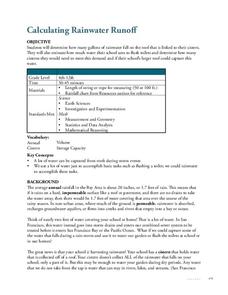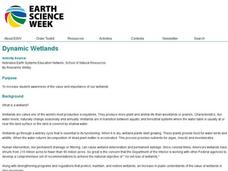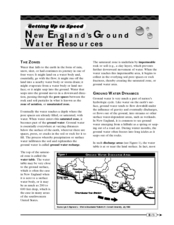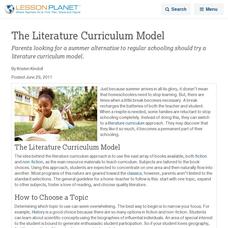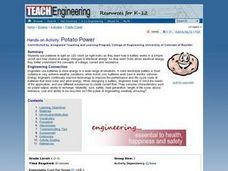Curated OER
Aquifers and Recharge Areas
Students create a model of an aquifer and describe how an aquifer works. They describe how running affects an aquifer and prepare a model presenting to local planners the important aspects of protecting recharge areas.
Techbridge Curriculum
Calculating Rainwater Runoff
Thirsty plants soak up every bit of a rainfall, but what happens to the rain that hits the roof? Calculate the amount of rainwater from your school's roof with an Earth science activity, which brings measurement skills, observation...
Curated OER
Spongy Wetlands
Students sort things that absorb and things that do not absorb, They predict, orally or in writing, what happens to houses with or without wetlands. Students build a wetland area in a meat tray to show how wetlands absorb water, and they...
Curated OER
Science Excursion: Cover Mapping Land
Young scholars study remotely sensed images and topographic maps to classify land cover types in their watershed area. They take samples in the watershed area to interpret the images.
Curated OER
Map on the Wall
Students examine the Ogallala aquifer water storage facility, identify rivers that refill the aquifer, and locate major cities near by. Students make maps of the area.
Curated OER
Dynamic Wetlands
Learners construct and observe a model of two different types of wetlands. In this wetlands lesson, students create a model of a wetland with constant drainage and a wetland that maintains a well-saturated soil. Learners observe and...
Rivanna Regional Stormwater Education Partnership
Does It Soak Right In?
Which materials are best for groundwater runoff, and which are best for percolation? Discuss the water table with several experiments about different types of soil, pollution, precipitation, and filtration. The experiments assign roles...
Pennsylvania State University
Learn, Protect, and Promote Water
A hands-on activity helps learners explore the water cycle. After discussing how they use water, classes discuss water pollution and then move into a simulation where 20 pupils move through the water cycle based on description cards.
University of Wisconsin
Designing a Rain Garden
Now it's time for all of the data collected in previous lessons to be applied to the design of a rain garden. This resource can only be used as part of the greater whole, since learners will need to rely on gathered knowledge in order to...
Environmental Protection Agency (EPA)
New England's Ground Water Resources
Learn all about where ground water is stored, how it moves, and how it is accessed in a detailed and thorough 10-page reading. Whether supplementing reading for an existing environmental or earth science course or providing background...
Curated OER
The Literature Curriculum Model
Parents looking for a summer alternative to regular schooling, should try a literature curriculum model.
University of Wisconsin
Conjunction Function
As part of a unit, this lesson familiarizes youngsters with components of a rain garden. They speculate about the role of an assigned component in contributing to a rain garden, and ultimately, in the health of the local watershed. Each...
Curated OER
Jumpin' Pepper and Lazy Salt
Students examine the result of a negative charge. After rubbing a balloon with a wool cloth, students hold it over a mixture of salt and pepper. They observe the pepper "jumps" to the balloon. Students discuss their observations and then...
Curated OER
Aquifers
Learners participate in an experiment about aquifers. They answer questons and make observations about the experiment. They discuss how they can make a difference in the way water is used.
Curated OER
Potato Power
Students light a LED clock or light bulb using potatoes. They examine how a battery works in a simple circuit. They determine how chemical energy changes to electrical energy while experimenting with potato powered circuits.
Curated OER
Two-Cell Battery
Students build their own two-cell battery and determine which electrolyte solution is best suited for making a battery. They discuss background information for their experiment, construct and test their battery, and using the chart on...
Curated OER
Magnetism
In this magnets worksheet, students read about the properties of magnets, electromagnets, and magnetic fields. Then students complete 10 matching, 4 fill in the blank, and 8 word problems.
Curated OER
Magnetism
In this magnetism worksheet, students read about properties of magnets, permanent and temporary magnets, electromagnets, and magnetic fields. They match 10 terms about types of magnets with their definitions, they draw an electromagnet,...
Curated OER
Wacky Water Critters
Young scholars visit a local creek or stream. They collect water samples from the creek and observe and sort the "water critters" they find in the sample, observing smaller organisms under a microscope if necessary. They identify each...
Curated OER
Is Urban Sprawl Causing Us To Lose More Than Ground?
Learners map the changes that occur in the land as a result of urban sprawl. They explore the problems that paving and building have on the watershed and the habitats on the Northshore.
Curated OER
Plotting the Petroleum Plume
Eighth graders examine the difference between confining layers and aquifers in a basic water table aquifer scenario. They contour groundwater elevation and petroleum product thickness data.
Curated OER
Think Green
Students experience and practice compositing and recycling through hands-on-activities. They distinguish between which items from their trash can be recycled, composted and reused. The process for making recycled paper is also covered in...
Curated OER
Powering a Green Earth
Pupils compare and contrast renewable and nonrenewable energy. In this environmental science lesson, students discuss the importance of going green. They identify the different components in a power grid system.



